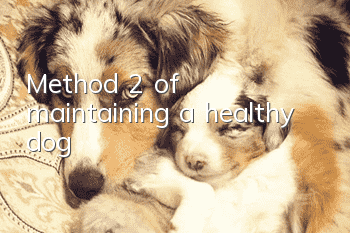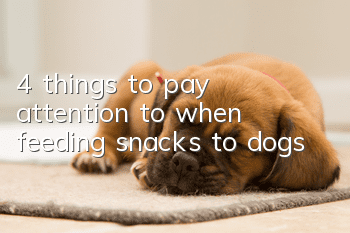Method 2 of maintaining a healthy dog

3. When do you need to eat weight loss diet?
Ideal weight:
The ribs can be felt but not visible; looking from top to bottom, you can see the waist; looking from the side, you can see the abdominal lines
Too heavy:
The ribs surrounded by fat can be palpated; the waist line is not obvious; the abdomen is round
Obesity:
The ribs are surrounded by thick fat; it is difficult to feel the fat accumulation in the waist; the waist and abdomen are not clearly visible or cannot be seen at all, and the waist and abdomen have no lines and are obviously swollen
Question:
Overweight and obese dogs and cats are at higher risk of physical diseases, including:
Arthritis; diabetes; difficulty breathing; heart problems; surgical complications; anesthesia complications; constipation; high blood pressure
Causes of obesity:
3 main factors causing pets to be overweight:
Overeating; low activity; genetics
Some pets seem to eat very little but gain weight quickly. These pets may have genetic factors that predispose them to obesity. A small number of dogs and cats gain weight simply due to hormonal imbalances or other illnesses. However, the most common cause of obesity is overeating. There are many factors that lead to overeating, including feeling depressed, emotionally stressed, poor eating habits, or eating unsuitable diets.
Solution:
If you suspect your dog or cat is overweight or obese, consult your veterinarian. Your veterinarian will carefully examine your pet for any underlying medical conditions.
Under normal circumstances, overweight pets require a series of weight loss programs. Eat specially formulated diet food to help them solve their obesity problem!
4. When do you need to eat gastrointestinal prescription food
Questions - Diarrhea, gastrointestinal and pancreatic diseases
Symptoms:
Diarrhea; vomiting; blood/or mucus in the stool; recurring soft stools every few weeks; constipation; loss of appetite; weight loss
Reason:
Parasite, especially worms (puppies); viral infection resulting in diarrhea (puppies); eating unclean, rotten food or other garbage (puppies); bacterial overgrowth (puppies and adult pets) ); enteritis disease (adult pets); insufficient pancreatic juice secretion (adult pets)
Solution:
If you suspect your dog or cat has gastrointestinal problems, consult your veterinarian. Your veterinarian will examine your pet in detail, perform tests if necessary, and decide on appropriate treatment.
If your pet is found to have gastrointestinal or pancreatic disease, in addition to the treatments recommended by veterinarians, you may also need to eat specially formulated gastrointestinal prescription food to help your pet solve gastrointestinal problems!
- Why do dogs like to eat shit?
- How to train a two-month-old Samoyed? Discuss how to raise a Samoyed!
- What should I do if my dog vomits?
- How to prevent ticks on dogs
- How many days does it take to start training a German Shepherd? You will know after reading this!
- Dog training methods and teach you how to communicate with your dog!
- What should I do if my horse-dog doesn’t bark? Can it be trained?
- Is it okay to use Beveto to deworm dogs externally?
- Causes and treatments of pyoderma in dogs
- What is the difference between a Bichon Frize and a Teddy? How to distinguish a Bichon Frize from a Teddy?



